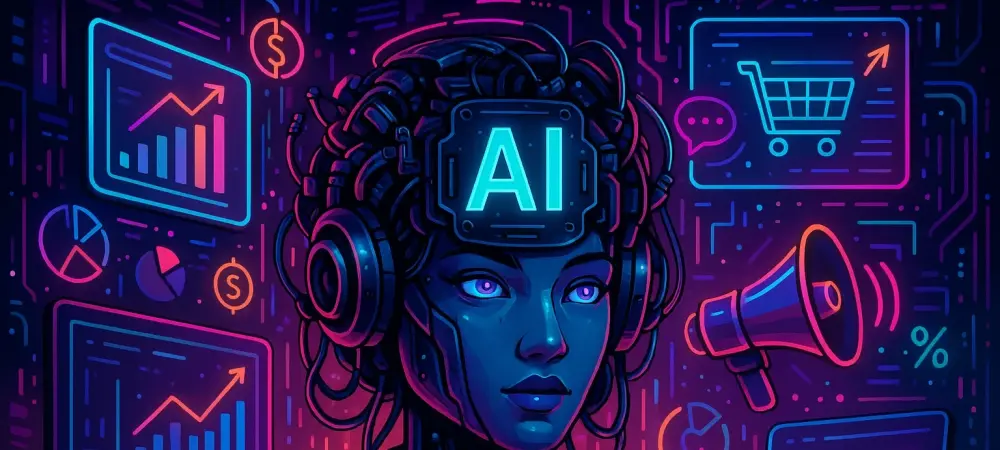Artificial Intelligence (AI) tools have become a mainstay in the digital marketing landscape, transforming the way businesses engage with consumers and implement marketing strategies. In recent years, the integration of AI into marketing processes has redefined efficiency and creativity, allowing marketers to achieve unprecedented levels of precision and productivity. This roundup article explores various expert opinions and insights on the impact of AI tools on digital marketing, shedding light on trends, challenges, and the future of this revolutionary technology.
The New Era of Marketing: Embracing AI for Unprecedented Growth
As the marketing landscape undergoes rapid transformation, the adoption of AI is unlocking new growth potential. Experts trace the digital marketing evolution, noting how automation used to be centered on basic email drip campaigns and simple data tracking. Now, AI has taken center stage, fundamentally reshaping marketing strategies and operations. Significant areas influenced by AI include workflow automation, data-driven customer insights, and hyper-personalized campaigns, which have become crucial for staying competitive in a fast-paced market.
Experts agree that AI’s transformative impact allows businesses to streamline operations and sharpen their marketing efforts, utilizing technology to drive meaningful consumer engagement. The integration of AI tools means marketers are no longer bogged down by mundane tasks, freeing them to explore strategic initiatives and creative solutions.
The Automators of Tomorrow: AI in Routine Marketing Tasks
Automating the Mundane: Efficiency Through AI Tools
AI tools are lauded for their ability to automate repetitive and time-consuming tasks, significantly enhancing efficiency. Tasks like keyword research and performance tracking can now be managed by AI, allowing marketers to allocate their focus to higher-order strategizing. Industry analysts point out that automation can lead to remarkable time savings and improved productivity, with the added benefit of reducing operational costs.
Nevertheless, challenges remain, including technology dependency and the skill gaps in AI literacy among marketers. While technological integration enhances operations, it also requires marketers to upskill and adapt to evolving digital tools, posing a challenge for some organizations.
Strategic Insights: AI’s Role in Deciphering Consumer Behavior
Beyond automation, AI excels in its analytical capabilities, offering valuable insights into consumer behavior and trends. AI-driven analytics enable marketers to refine strategies, personalizing campaigns to align with customer preferences and increase engagement. Numerous case studies demonstrate AI’s prowess in crafting tailored marketing initiatives, optimizing everything from product recommendations to content targeting.
However, this capability is not without concerns. Experts caution that despite opportunities for greater precision, the use of AI necessitates careful handling of data privacy and ethical considerations, ensuring consumer trust is maintained while harnessing technology’s full potential.
Emerging Innovations: Shaping the Future of Marketing with AI
Current AI innovations, such as predictive analytics and AI-driven content generation, signify a new frontier in digital marketing. Adoption rates differ across regions and sectors, with some businesses more quickly embracing new technologies than others. While many continue to debate the relative merits of creativity versus machine-led strategies, consensus suggests that a balanced integration of both is essential.
The skepticism from some sectors underscores the ongoing deliberation over AI’s role in creativity. However, experts emphasize that AI should be seen as a complement, potentially driving creativity in unexpected and fruitful directions.
Beyond the Basics: AI Meeting Niche Marketing Needs
AI tools are increasingly adept at addressing niche marketing requirements like hyper-personalization and micro-targeting, offering solutions tailored to unique business objectives. Expert opinions vary on whether AI can wholly meet specific marketing goals, with some arguing that bespoke strategies still require a human touch.
As AI continues to evolve, it is poised to refine digital marketing strategies further, aiding marketers in crafting campaigns that resonate deeply with target audiences. The evolution suggests a future where AI tools become increasingly sophisticated, matching even the most specialized needs.
Harnessing AI for Strategic Advancement
The insights gathered illustrate AI’s pivotal role in bolstering marketing strategies through automation, enhanced consumer insights, and personalization. Effective integration of AI tools requires careful planning, with industry best practices recommending that marketers start small, gradually scaling up as they learn to leverage these technologies for maximum impact.
Advice for those new to AI emphasizes understanding the technology’s potential thoroughly and fostering a culture of continuous learning to keep pace with innovations. Marketers embarking on their AI journey are encouraged to focus on long-term strategic alignment, ensuring technology serves their broader business goals.
The Road Ahead: AI’s Lasting Influence on Digital Marketing
As AI continues to influence digital marketing, its role is firmly established as both a cornerstone and catalyst for industry innovation. The implications for the future are vast, including shifts in marketer roles and responsibilities, as technology automates more aspects of the marketing process.
Ultimately, embracing AI innovations shall create new pathways for creativity and strategic focus, empowering marketers to deliver more personalized, effective campaigns. Those who integrate AI successfully are likely to gain a competitive edge, shaping marketing practices that are not only efficient but also resonate with ever-evolving consumer expectations.

